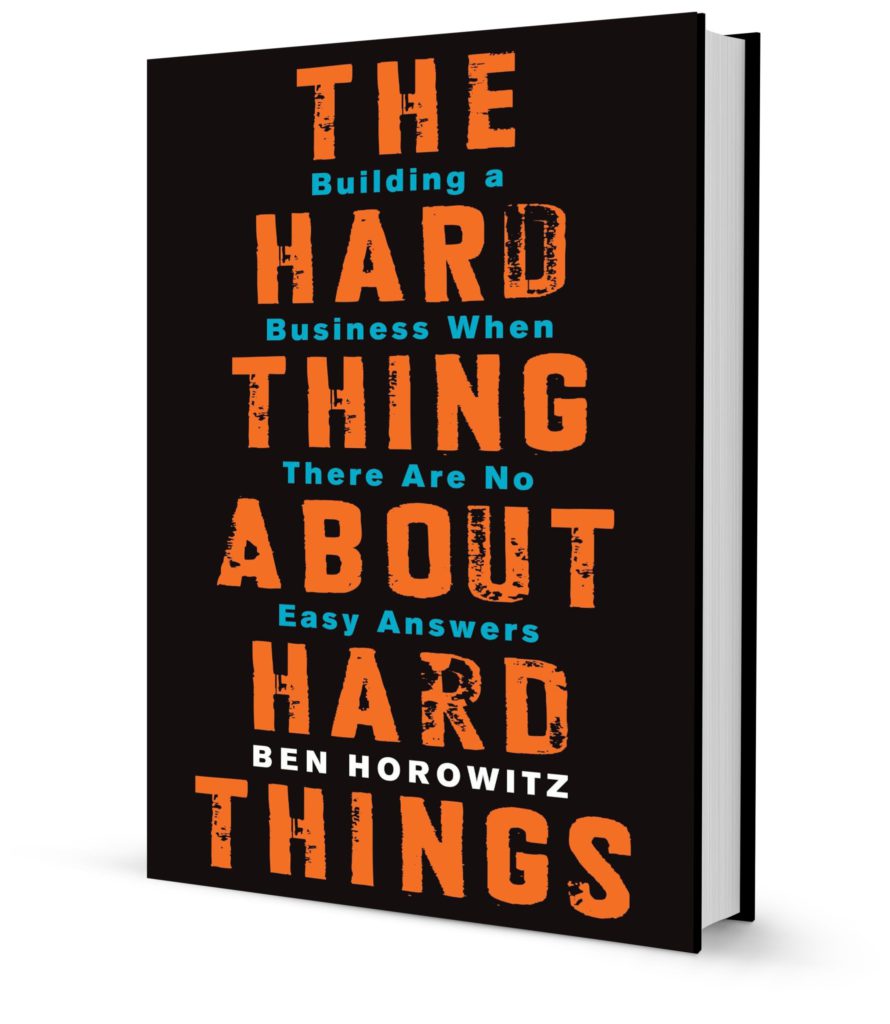Reading: The Hard Thing About Hard Things: Building a Business When There Are No Easy Answers
The book is a must read for startups and growth ceo’s. It’s not a book written by a management guru, but by someone who has been in the trenches and doubtless had a lot of sleepless nights figuring out how to make his company survive. There’s a lot of advise for CEO’s in there, ranging from how to direct your company through rough times, to minimising politics in your company.
Some of the highlights that I found worthwhile:
Crediting Grove – It was interesting that in the book Ben Horowitz makes a number of references to the works of Andy Grove, name “High output management” and “Only the paranoid survive“. Andy turned Intel around from a memory company to the biggest chip company in the world, so pay attention, and read his work too.
Lead bullets – “Ben, those silver bullets that you and Mike are looking for are fine and good, but our web server is five times slower. There is no silver bullet that’s going to fix that. No, we are going to have to use a lot of lead bullets.” “There’s not always a magical way out of your problems. Sometimes you just have to knuckle down and keep on going with all that you have.” The other interesting quote in this section was:
“There comes a time in every company’s life when it must fight for its life. If you find yourself running when you should be fighting, you need to ask yourself: “If our company isn’t good enough to win, then do we need to exist at all?” if you have the better product, why not knuckle up and go to war?”
War and Peace – what CEO are you? – A peacetime CEO will focus on expanding the market and company’s strength. A wartime CEO is fending off immediate and existential threats (read Only the paranoid survive to catch up on strategic inflection points) . Can one CEO be both? You can read more on wartime versus peacetime CEO’s here.
People Product Profit – In that order. Take care of your people first, they are the ones that will make your product win, and in turn realise your profit.
A Market of ONE – The most important rule of raising money privately, look for a market of one. You only need one investor to believe in you and invest
2 kinds of friends – You need 2 kinds of friends in your life: one with real excitement, and a second kind of friend to call when things go horribly wrong. When your life is on the line and you only have 1 phone call to make, who’s it going to be?
If you’re going to eat shit, don’t nibble – Pretty straightforward!
Don’t believe in statistics – Startup ceo’s should not play the odds. Don’t believe in statistics, believe in calculus. Secret of a successful CEO? There is one skill: focus and make the best move when there are no good moves.
Ask for problems – Build a culture that rewards, not punishes people to bring problems in the open where they can be solved. The “old management standards” say “don’t bring me a problem without bringing a solution”. Well, if the employee had the solution, he wouldn’t need to bring it to the manager now, would he?
Time – spend zero time on what you could have done and spend all of your time on what you can do. Because in the end, nobody cares
Product Managers – good product managers think in terms of delivering superior value to the market place during product planning and achieving market share and revenues goals during the go to market phase.
Hiring senior people in your company – When do you need to start hiring senior people, what types, advantages and disadvantages? Also an Andy Grove quote that hits home: the peter principle is unavoidable (full quote: “the Peter Principle is unavoidable, because there is no way to know a priori at what level in the hierarchy a manager will be incompetent“). The author gives some good advice on how to check if they are doing a good job, and when and why you need senior people. He addresses the questions like “won’t they ruin the culture with their costumes, political ambitions and the need to go home to see their family?” Maybe yes, but bringing in the right kind of experience at the right time can mean the difference between bankruptcy and glory. You’ll need a new executive to be more than a goal achiever, he/she needs to be part of the team. The CEO needs to evaluate people on current role, and nobody comes out of the womb knowing how to manage a 100 people. Managing at scale is a learned skill rather than a natural ability, and it’s nearly impossible to make judgement in advance.
The shit sandwich – from “the one minute manager” – go look it up. 🙂
Be honest but courteous with feedback – if you think a presentation sucks, just say it and give the reasons why. Watered down feedback is worse than no feedback at all. But… don’t go and show off your superiority.
What’s your story – a company without a story is usually a company without a strategy (see the amazon example – it’s amazing, Jeff Bezos wrote this in 1997!)

Recent Comments